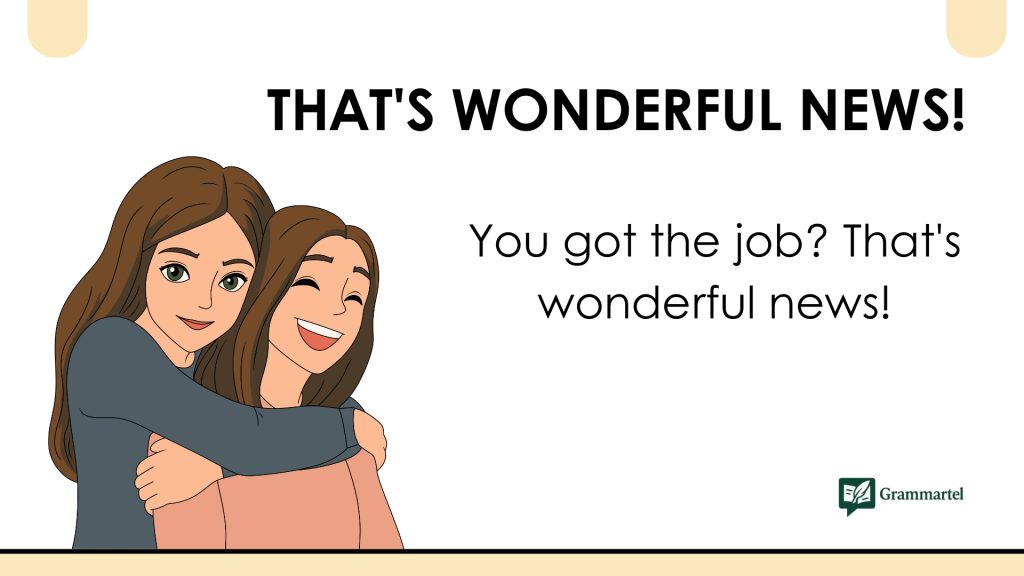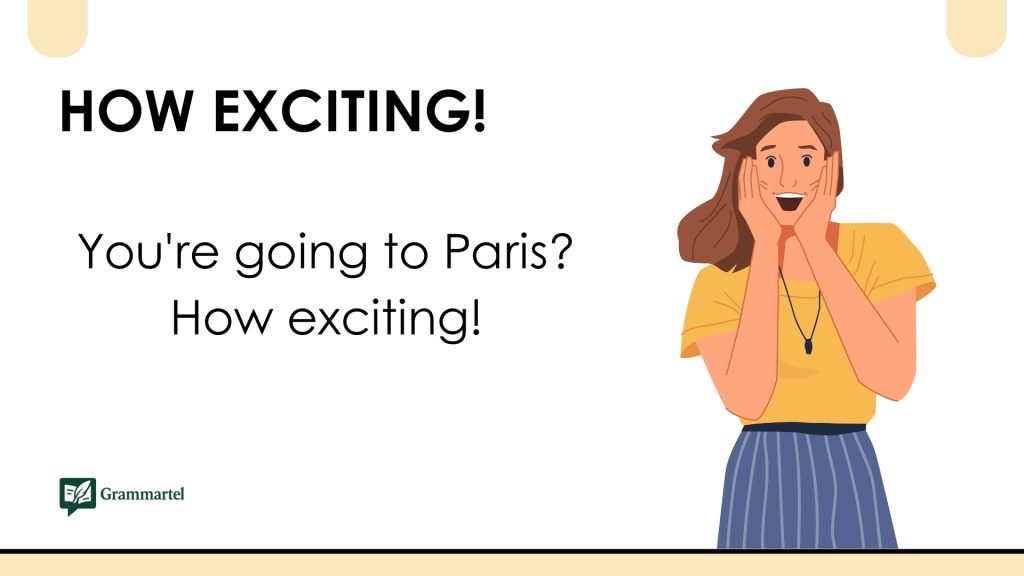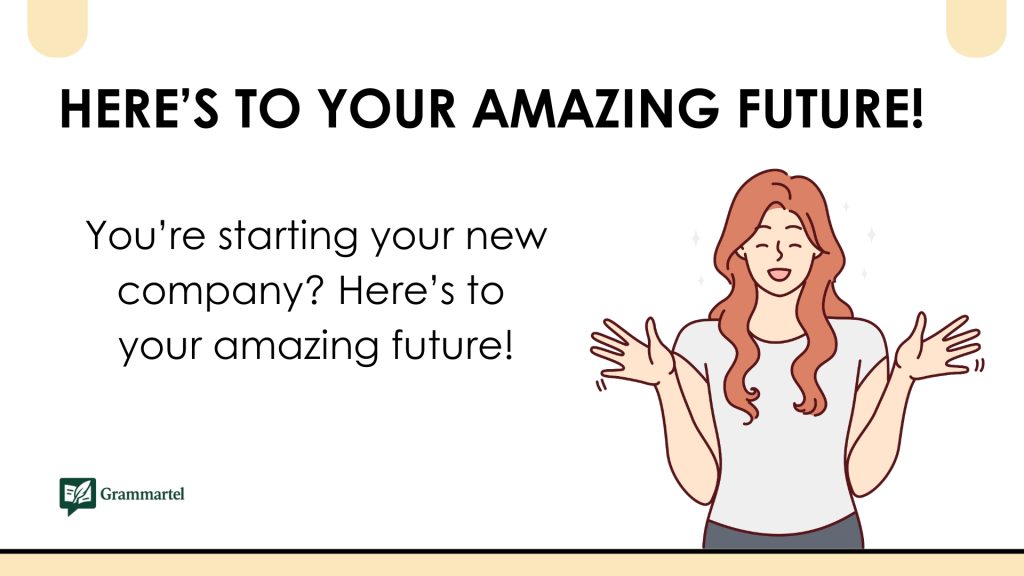We all know how great it feels when someone celebrates our wins—big or small. Whether it’s a friend landing a dream job or your cousin getting engaged, saying “I’m happy for you” is a thoughtful way to show you care. But sometimes, you want to say it with a bit more heart, humor, or personality. That’s where this list comes in! From sweet and sincere to playful and creative, here are 40 different ways to let someone know you’re truly happy for them—with real-life examples to make it easy. Because sharing joy shouldn’t sound like a script, right?
What Does “I’m Happy for You” Mean?
The phrase “I’m happy for you” means that you feel glad because something good has happened to someone else. It shows that you care about their success, joy, or achievement. When you say this, you are sharing in their happiness, even if it does not affect you directly. It is a kind and supportive thing to say.
This phrase is often used when someone gets a new job, wins a prize, or reaches a goal. It tells them that you are proud and excited for them. Saying it with a smile and a warm tone makes it more honest.
When to Use “I’m Happy for You”
Use “I’m happy for you” when someone shares good news. For example, if your friend gets married, has a baby, or passes an exam, this phrase fits well. It shows you care and want the best for them.
Do not use it if you feel jealous or fake. Only say it when you mean it. People can feel if your words are not true. When said with love, “I’m happy for you” can make someone’s day better.
40 Unique Ways to Say “I’m Happy for You”
1. That’s wonderful news!

Meaning: I’m genuinely pleased to hear your good news.
Explanation: A warm and straightforward way to express shared joy.
Example: “You got the job? That’s wonderful news!”
Best Use: Celebrating promotions, engagements, or any major milestone.
Worst Use: Minor achievements like buying a new pen.
Tone: Warm, enthusiastic
2. I’m so thrilled for you!
Meaning: I’m extremely excited and happy about your good fortune.
Explanation: Expresses a high level of excitement and shared happiness.
Example: “You’re moving to Italy? I’m so thrilled for you!”
Best Use: Big life changes like moving, getting married, or landing a dream job.
Worst Use: Everyday wins like finishing a book.
Tone: Excited, supportive
3. You deserve it!
Meaning: I’m happy for you and think you’ve earned this.
Explanation: Adds a layer of validation and recognition of effort.
Example: “You finally got published! You deserve it!”
Best Use: When someone has worked hard toward a goal.
Worst Use: Luck-based outcomes like lottery wins.
Tone: Affirming, supportive
4. That makes me so happy to hear.
Meaning: Your good news brings me happiness too.
Explanation: Emphasizes emotional connection to the other person’s success.
Example: “Your mom is doing better? That makes me so happy to hear.”
Best Use: Health updates, family milestones.
Worst Use: Competitive contexts.
Tone: Empathetic, gentle
5. I’m over the moon for you!
Meaning: I’m extremely happy about your news.
Explanation: A colorful idiom to show strong joy.
Example: “You got into Harvard? I’m over the moon for you!”
Best Use: Huge accomplishments or surprises.
Worst Use: Formal or professional settings.
Tone: Informal, exuberant
6. So proud of you!
Meaning: I’m happy and impressed by your achievement.
Explanation: Combines joy with admiration.
Example: “You ran your first marathon? So proud of you!”
Best Use: When someone overcomes a challenge or reaches a goal.
Worst Use: For peers who might not welcome being “parented.”
Tone: Affectionate, encouraging
7. I’m celebrating with you!
Meaning: I’m joining in your joy.
Explanation: Suggests shared excitement and emotional solidarity.
Example: “You passed the bar exam? I’m celebrating with you!”
Best Use: Good for remote celebrations or texting.
Worst Use: In somber or reflective achievements.
Tone: Festive, inclusive
You might also like : 40 Heartfelt Ways to Say “Happy Easter” (With Real Examples).
8. That’s amazing!
Meaning: I think your news is fantastic.
Explanation: Simple and strong praise.
Example: “You launched your first app? That’s amazing!”
Best Use: For anything impressive or unexpected.
Worst Use: Can feel vague if overused.
Tone: Upbeat, positive
9. I couldn’t be happier for you.
Meaning: I’m at peak happiness over your good news.
Explanation: Deeply heartfelt and emphatic.
Example: “You’re engaged?! I couldn’t be happier for you!”
Best Use: Emotional announcements.
Worst Use: Lighthearted or sarcastic contexts.
Tone: Sincere, emotional
10. You’ve earned every bit of it.
Meaning: I’m happy because you worked hard for this.
Explanation: Adds respect and recognition.
Example: “You got that scholarship? You’ve earned every bit of it.”
Best Use: When hard work clearly led to success.
Worst Use: Windfalls or random luck.
Tone: Respectful, validating
11. I’m genuinely happy for you.
Meaning: I sincerely share in your happiness.
Explanation: Emphasizes authenticity and true goodwill.
Example: “You got the grant? I’m genuinely happy for you.”
Best Use: Personal conversations or heartfelt moments.
Worst Use: Casual texts or humor.
Tone: Honest, warm
12. That’s fantastic!
Meaning: Your news is exceptionally good.
Explanation: Broad, upbeat praise.
Example: “You aced your finals? That’s fantastic!”
Best Use: Academic or career wins.
Worst Use: Sensitive contexts.
Tone: Positive, casual
13. How exciting!

Meaning: Your news fills me with excitement.
Explanation: Focuses on the energy of the moment.
Example: “You’re going to Paris? How exciting!”
Best Use: Travel, moves, big events.
Worst Use: Accomplishments with less buzz.
Tone: Light, energetic
14. So glad to hear that.
Meaning: Your good news brings me comfort or joy.
Explanation: Milder, calm approval.
Example: “You’re finally feeling better? So glad to hear that.”
Best Use: Health or life updates.
Worst Use: Major celebrations.
Tone: Calm, kind
15. You must be so happy—and I am too!
Meaning: I feel joy along with you.
Explanation: Links your happiness with theirs.
Example: “You’re expecting a baby? You must be so happy—and I am too!”
Best Use: Big life events.
Worst Use: Overused in formal settings.
Tone: Personal, warm
16. It couldn’t have happened to a better person.
Meaning: You are fully deserving of this good thing.
Explanation: A way to compliment and celebrate.
Example: “You got the award? It couldn’t have happened to a better person.”
Best Use: Promotions, honors.
Worst Use: When others feel overlooked.
Tone: Warm, generous
17. Good for you!
Meaning: I’m happy and impressed.
Explanation: Short and supportive.
Example: “You started your own business? Good for you!”
Best Use: Any personal or professional milestone.
Worst Use: Can sound dismissive if tone isn’t sincere.
Tone: Friendly, upbeat
18. You’re glowing—I love seeing you like this.
Meaning: I can see your happiness and it makes me happy too.
Explanation: Observational and caring.
Example: “New relationship? You’re glowing—I love seeing you like this.”
Best Use: Emotional or romantic news.
Worst Use: Professional context.
Tone: Affectionate, soft
19. Big congrats!
Meaning: Congratulations—I’m happy for you!
Explanation: Friendly shorthand for congratulations.
Example: “You sold your first painting? Big congrats!”
Best Use: Texts, emails, online comments.
Worst Use: Very formal occasions.
Tone: Casual, cheerful
20. This is such great news!
Meaning: I see your news as positive and important.
Explanation: Safe, all-purpose expression of joy.
Example: “You’re getting a promotion? This is such great news!”
Best Use: Work or family updates.
Worst Use: Trivial events.
Tone: Positive, neutral
21. I’m beyond happy for you.
Meaning: I’m extremely happy about your news.
Explanation: Intensified expression of joy.
Example: “You finished your novel? I’m beyond happy for you!”
Best Use: Long-awaited accomplishments.
Worst Use: Situations where modesty is preferred.
Tone: High-energy, heartfelt
22. This totally made my day!
Meaning: Your good news has uplifted me.
Explanation: Reflects joy and appreciation.
Example: “Your recovery news? This totally made my day!”
Best Use: Feel-good moments.
Worst Use: If the speaker needs to stay neutral.
Tone: Bright, friendly
23. Wow, just wow! So happy for you.
Meaning: I’m amazed and delighted.
Explanation: Emphasizes surprise and delight.
Example: “Your song hit 1 million streams? Wow, just wow! So happy for you.”
Best Use: Unexpected achievements.
Worst Use: Low-key updates.
Tone: Enthusiastic, informal
24. You’re killing it!
Meaning: You’re doing really well—and I love it.
Explanation: Colloquial way to show admiration and happiness.
Example: “Another successful pitch? You’re killing it!”
Best Use: Young, creative, or casual audiences.
Worst Use: Traditional or formal situations.
Tone: Cool, energetic
25. Love seeing you win!

Meaning: Your success makes me happy.
Explanation: Focuses on enjoying someone else’s joy.
Example: “You got a sponsor? Love seeing you win!”
Best Use: On social media or texts.
Worst Use: Formal settings.
Tone: Trendy, upbeat
26. You inspire me!
Meaning: Your happiness is motivating.
Explanation: Shows both happiness and admiration.
Example: “You’ve turned your life around. You inspire me!”
Best Use: Life transformations.
Worst Use: Routine events.
Tone: Emotional, admiring
27. This is everything!
Meaning: This moment is perfect and joyful.
Explanation: A trendy, enthusiastic reaction.
Example: “You two got engaged? This is everything!”
Best Use: Romantic or emotional achievements.
Worst Use: Dry professional milestones.
Tone: Dramatic, expressive
28. That’s a huge win!
Meaning: I recognize your success as a big deal.
Explanation: Affirms the significance of the achievement.
Example: “First home bought? That’s a huge win!”
Best Use: Financial, academic, or career accomplishments.
Worst Use: Modest or personal wins.
Tone: Confident, assertive
29. What a blessing!
Meaning: I’m happy and grateful on your behalf.
Explanation: Often used with a spiritual or emotional tone.
Example: “You’re having twins? What a blessing!”
Best Use: Faith-based or family-oriented news.
Worst Use: Professional settings.
Tone: Reflective, warm
30. You’ve got me smiling ear to ear.
Meaning: Your joy is contagious.
Explanation: Indicates emotional resonance.
Example: “You’re finally living your dream? You’ve got me smiling ear to ear.”
Best Use: Milestones or life goals.
Worst Use: Business interactions.
Tone: Friendly, warm
31. This calls for a celebration!
Meaning: Your good news deserves a party.
Explanation: Suggests shared happiness and festivities.
Example: “You’re cancer-free? This calls for a celebration!”
Best Use: Huge personal triumphs.
Worst Use: Modest successes.
Tone: Joyful, festive
32. You just made my week.
Meaning: Your news brought me extended joy.
Explanation: Goes beyond a momentary feeling.
Example: “You got your dream house? You just made my week!”
Best Use: Big surprises.
Worst Use: Minor good news.
Tone: Cheerful, sincere
33. I’ve been rooting for you!
Meaning: I’ve been hoping for your success.
Explanation: Shows support and happiness.
Example: “You finally opened your café? I’ve been rooting for you!”
Best Use: Long journeys or challenges.
Worst Use: News you weren’t aware of.
Tone: Loyal, proud
34. That’s so heartwarming.
Meaning: Your news touches me emotionally.
Explanation: Shows deep appreciation for positive news.
Example: “You reunited with your dad? That’s so heartwarming.”
Best Use: Family or emotional events.
Worst Use: Academic or financial updates.
Tone: Tender, emotional
35. Pure joy!
Meaning: Your news is simple, beautiful happiness.
Explanation: Short, impactful celebration of good news.
Example: “Baby photos? Pure joy!”
Best Use: Births, weddings, celebrations.
Worst Use: Complex situations.
Tone: Elegant, minimal
36. Ecstatic for you!
Meaning: I’m thrilled on your behalf.
Explanation: A concise way to say “I’m very happy for you.”
Example: “You passed the audition? Ecstatic for you!”
Best Use: Creative or career successes.
Worst Use: Formal conversations.
Tone: Passionate, concise
Related reading : 40 Alternatives Ways to Say “Happy to See You” Naturally (With Examples).
37. It fills my heart to hear that.
Meaning: Your happiness deeply affects me.
Explanation: Indicates genuine emotional connection.
Example: “You’re getting back on your feet? It fills my heart to hear that.”
Best Use: Comebacks, recoveries.
Worst Use: Surface-level news.
Tone: Compassionate, sincere
38. So excited for what’s ahead for you.
Meaning: I’m happy now and excited for your future.
Explanation: Projects positivity forward.
Example: “You got the internship? So excited for what’s ahead for you!”
Best Use: New opportunities.
Worst Use: Completed achievements.
Tone: Optimistic, forward-looking
39. Couldn’t happen to a more deserving person.
Meaning: You fully deserve this happiness.
Explanation: A way to show deep admiration and joy.
Example: “You’re finally retiring? Couldn’t happen to a more deserving person.”
Best Use: Career wrap-ups or long goals.
Worst Use: Minor wins.
Tone: Respectful, celebratory
40. Here’s to your amazing future!

Meaning: I’m happy and hopeful for what comes next.
Explanation: A joyful, toasting sentiment.
Example: “You’re starting your new company? Here’s to your amazing future!”
Best Use: To close a congratulations message or toast.
Worst Use: Negative or uncertain situations.
Tone: Toast-like, hopeful
Conclusion
Saying “I’m happy for you” doesn’t have to feel routine. With a few words and a little creativity, you can turn a simple phrase into something that really sticks. Whether it’s cheering on your best friend or congratulating a co-worker, finding your own voice makes your support feel real. Try a few of these out next time—you might be surprised how much it means to someone.
Elevate your content and captivate readers with Grammartel.

